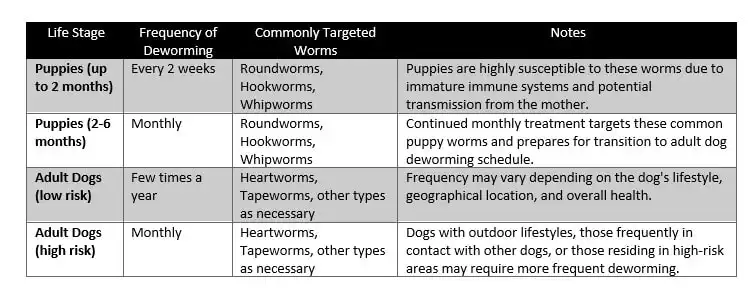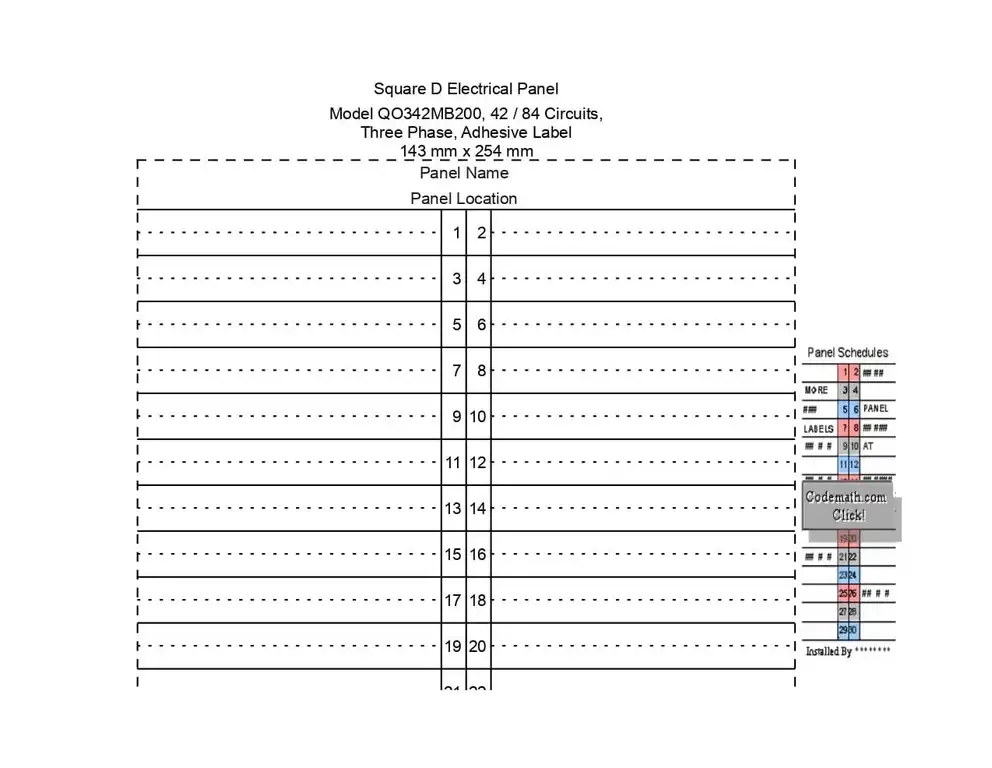Dog Deworming Schedule Chart – In the world of canine health, parasitic worms are nefarious actors. These microscopic invaders can wreak havoc in a dog’s system, causing symptoms ranging from digestive discomfort to severe malnutrition. To combat this, dog deworming is crucial, involving the administration of specialized medications to expel these internal parasites.
Understanding the Need for a Deworming Schedule
Understanding the necessity of a deworming schedule for your dog is pivotal in ensuring its health, longevity, and overall well-being. Below, we delve into why a deworming schedule is indispensable in pet healthcare.
- Lifecycle of Parasitic Worms: Parasitic worms, irrespective of their type, undergo a life cycle that includes egg, larval, and adult stages. The duration of these stages can vary, but invariably, each stage represents a window of opportunity for infestation. Regular deworming, in line with the worm’s lifecycle, helps break this cycle, preventing the worm from reaching a stage where it can cause harm to your dog.
- Environmental Persistence of Worm Eggs: Parasitic worm eggs, shed into the environment through the feces of infected animals, are remarkably resilient. They can survive in the soil for years, providing a constant source of potential infestation for your dog. Regular deworming helps protect your dog from this ever-present threat.
- High Rate of Reinfestation: The ubiquity of parasitic worms and their environmental hardiness means that dogs are at constant risk of reinfestation. Even if a dog has been successfully treated for worms, it can quickly become reinfested through contact with contaminated environments. A regular deworming schedule helps manage this perpetual risk.
- Zoonotic Potential of Dog Worms: Several dog worms, including certain roundworms and hookworms, have zoonotic potential. It means they can be transmitted from animals to humans, where they can cause disease. Regularly deworming your dog reduces the risk of these zoonotic infections, protecting your dog’s health and that of your family.
- Clinical Signs Are Often Absent: Dogs infected with worms may only show overt signs once the infestation is well-established and has begun to cause significant damage. Regular deworming can help protect your dog from unseen threats, offering a crucial defense against silent invaders.
A solid understanding of the need for a deworming schedule underscores this preventive measure’s crucial role in your dog’s health management strategy. It provides an optimal way to prevent, identify, and treat potential worm infestations, keeping your dog in the best possible health.
Types of Worms Dogs Can Get
A spectrum of parasitic worms can afflict dogs, each exhibiting distinctive traits, life cycles, and potential health impacts. Awareness of these parasites equips pet owners to execute a more pointed and efficient deworming plan.
- Roundworms: They are also classified as ascarids and represent one of the dogs’ most widespread parasitic intruders. Two types are prevalent in dogs: Toxocara canis, typically found in puppies, and Toxascaris leonina, affecting canines of all ages. Ingesting contaminated soil or eggs or the transference from a pregnant or nursing mother to her puppy causes infection. Residing in a dog’s intestines, roundworms consume semi-digested food. This infestation can trigger gastrointestinal issues, subpar growth, and in critical cases, a distended belly and a lethal intestinal obstruction.
- Hookworms: These slender, minuscule worms anchor themselves to the intestinal wall, siphoning off the dog’s blood, thereby causing internal blood loss. Hookworms infiltrate their host from contaminated soil through consumption or dermal penetration, often via the dog’s feet. Puppies can also become infected through their mother’s milk. The presence of hookworms is usually marked by anemia, dark, tarry stools, and diarrhea.
- Whipworms: Dubbed for their whip-like structure, with a thick rear end and a slender, elongated front end, whipworms inhabit the large intestine. Their presence can induce inflammation, bloody diarrhea, weight loss, and in serious cases, electrolyte imbalances. Infection occurs through the ingestion of eggs from contaminated soil.
- Tapeworms: Tapeworms are flat, segmented worms that infiltrate dogs by ingesting a host harboring the tapeworm larvae, often a flea. Tapeworm segments resemble rice grains and are typically observed in the dog’s feces or around its anal area. While generally less harmful, tapeworms can cause digestive issues and weight loss.
- Heartworms: Heartworms are transferred through the bites of infected mosquitoes, unique in their potentially fatal consequences for dogs. These worms reside not in the digestive system but in the heart, lungs, and blood vessels, inflicting severe organ damage and can provoke heart failure. Symptoms of heartworm disease often manifest only once the condition is advanced, potentially including coughing, lethargy, diminished appetite, and weight loss.
Knowledge about the multitude of worms that can afflict dogs is the cornerstone of effective prevention and treatment approaches. It highlights the essential role of a regular deworming schedule in protecting a dog’s health.
The Dog Deworming Schedule Chart: An Overview

A dog deworming schedule chart provides a productive tool, delineating recommended deworming intervals with the dog’s age, lifestyle, and geographical location in mind. It is a comprehensive guide to safeguard your canine companion from worm infestations.
Drafting a Deworming Schedule: Comparing Puppies and Adult Dogs
A thoughtfully formulated deworming schedule caters to the unique requirements of dogs at different stages of life. Factors such as susceptibility to worm infestations, the types of worms they are likely to encounter, and the frequency of deworming differ between puppies and adult dogs. Recognizing these differences can prove instrumental in shaping an efficient deworming timetable.
- Puppies
Given their developing immune systems and potential exposure to parasites in utero or via their mother’s milk, puppies are particularly vulnerable to worm infestations. Hence, the onset of deworming regimens for puppies is often remarkably early, typically around two weeks.
Companion Animal Parasite Council (CAPC) guidelines stipulate that puppies should undergo deworming every fortnight until they reach two months of age, followed by monthly deworming until the six-month milestone.
This regular and early deworming targets the worms most prevalent in puppies: roundworms, hookworms, and whipworms.
Upon reaching six months, the deworming schedule for puppies usually shifts to mirror that of adult dogs.
- Adult Dogs
The frequency of deworming adult dogs can vary, hinging on a host of factors, including the dog’s lifestyle, geographical location, and overall health status. Some dogs may necessitate deworming only a few times annually, while others may warrant monthly treatments.
The American Heartworm Society and CAPC advocate for annual heartworm testing for all dogs and year-round preventive medication. The necessity for treatments targeting other worms, such as tapeworms, generally arises if the dog consumes an infected flea or rodent.
Regardless of the dog’s age, discussing and seeking approval for any deworming schedule with a veterinarian is advisable. To draft a customized deworming schedule, a professional will consider various factors, such as the dog’s health profile, the prevalence of parasites in the local environment, and potential risks of exposure.
| Life Stage | Frequency of Deworming | Commonly Targeted Worms | Notes |
|---|---|---|---|
| Puppies (up to 2 months) | Every 2 weeks | Roundworms, Hookworms, Whipworms | Puppies are highly susceptible to these worms due to immature immune systems and potential transmission from the mother. |
| Puppies (2-6 months) | Monthly | Roundworms, Hookworms, Whipworms | Continued monthly treatment targets these common puppy worms and prepares for transition to adult dog deworming schedule. |
| Adult Dogs (low risk) | Few times a year | Heartworms, Tapeworms, other types as necessary | Frequency may vary depending on the dog’s lifestyle, geographical location, and overall health. |
| Adult Dogs (high risk) | Monthly | Heartworms, Tapeworms, other types as necessary | Dogs with outdoor lifestyles, those frequently in contact with other dogs, or those residing in high-risk areas may require more frequent deworming. |
*Note: Always consult with your vet for the most accurate deworming schedule tailored to your dog’s specific needs. This table is just a general guide and may vary depending on your dog’s health condition, local parasite prevalence, and potential exposure risks.
Frequency of Deworming

Determining the Deworming Frequency: An In-depth Examination
The frequency assessment for your dog involves considerable aspects, such as the dog’s age, lifestyle, and geographical location, each affecting the likelihood of parasitic worm infestations. In this section, we present a comprehensive analysis of the general guidelines put forth by credible veterinary authorities.
- Puppies
Due to their heightened susceptibility to worm infestations, especially to parasites such as roundworms and hookworms, which can be inherited from their mothers, puppies require a more frequent. The American Animal Hospital Association suggests deworming puppies every fortnight from 2 weeks to 12 weeks, followed by monthly until they reach six months.
- Adult Dogs
Adult dogs hinge largely on their lifestyle and the ensuing risk of worm infestations. The Companion Animal Parasite Council advises annual heartworm testing for dogs, with those yielding positive results undergoing the appropriate treatment. For dogs dwelling in heartworm-prevalent areas, year-round preventive treatment is prescribed.
Many veterinarians suggest a quarterly to combat other worms. However, dogs leading an outdoor lifestyle, frequently interacting with other dogs, or residing in high-risk locales may require to be dewormed better frequently.
- Pregnant and Nursing Dogs
In the latter stages of their pregnancy, minimize the odds of transmission to the puppies. Similarly, nursing dogs should undergo deworming to curtail the risk of postnatal transmission. For optimal timing and product selection, always consult with your veterinarian.
While these guidelines cater to a broad spectrum of circumstances, your dog’s situation might necessitate a different deworming schedule. It is imperative to seek advice from a trusted veterinarian to craft a deworming plan that optimally addresses your dog’s health requirements. Regular fecal testing and preventive treatments form the cornerstone of effective management and control of worm infestations, significantly securing the health and lifespan of your cherished canine companion.
For Notes: Companion Animal Parasite Council – https://capcvet.org/guidelines/general-guidelines/
| Dog Category | Deworming Frequency |
|---|---|
| Puppies | Deworm every fortnight from 2 weeks to 12 weeks, then monthly |
| Adult Dogs | Annual heartworm testing, with positive results requiring treatment. Year-round preventive treatment in heartworm-prevalent areas. Quarterly deworming for other worms. Dogs with high-risk lifestyles may require more frequent deworming. |
| Pregnant and Nursing Dogs | Deworming recommended in the latter stages of pregnancy and for nursing dogs. Consult with a veterinarian for optimal timing and product selection. |
How to Administer Deworming Medication
The process of administering deworming medication to your pet depends on the format of the medication and the specifics of your dog’s health condition. Oral medications are common and can often be found in flavored forms to encourage your pet to consume them willingly. Alternatively, certain deworming medications may come as topical creams or injections.
Always follow the instructions provided by your veterinarian or those found on the medication packaging. Measure dosages accurately, according to your pet’s weight, to ensure efficacy and prevent possible side effects. For resistant pets, hiding medication in treats or using a pet pill dispenser might be beneficial.
Recognizing Signs of Worm Infestation
Despite your best efforts, your pet might still become infected with worms. Therefore, recognizing the signs of worm infestation is crucial in seeking timely veterinary care. These signs may include, but are not limited to:
- Diarrhea or loose stool, sometimes containing blood or worm segments
- Weight loss despite a normal or increased appetite
- Dull coat and skin irritations
- Scooting or dragging the bottom on the ground
- Vomiting
- Visible worms in fur or around the dog’s rear
It’s essential to contact your vet immediately if you notice any of these signs. They can provide a definitive diagnosis and recommend an appropriate treatment plan.
Regular Veterinary Check-ups
Regular veterinary check-ups are crucial for maintaining your dog’s health, even with a diligent deworming schedule. Your vet can perform routine fecal examinations to check for the presence of worm eggs or larvae, which may be missed during home checks. They can also adjust the deworming schedule based on your dog’s risk factors, overall health condition, and any changes in local parasite prevalence.
Creating a Dog Deworming Schedule Chart
A dog deworming schedule chart is a visual aid that can help you keep track of your dog’s deworming dates, medication types, and any reactions or side effects. A typical chart may include columns for dates, medication names, dosages, and notes.
The chart should be updated regularly with each deworming session and reviewed during vet visits. It can provide a quick overview of your dog’s deworming history, allowing for easy identification of patterns or issues and ensuring that deworming sessions are noticed.
Maintaining a consistent dog deworming schedule is integral to responsible pet ownership. It’s a proactive measure that ensures your dog’s health and happiness, safeguards your family’s health, and contributes to the overall reduction of parasitic worms in the pet population. By understanding the various types of worms, recognizing signs of infestation, and keeping a regular deworming schedule, you can provide your canine companion with a safe and nurturing environment to thrive. Consult your trusted veterinarian to create and implement an effective deworming schedule tailored to your dog’s needs.
The Role of Vets in Deworming Schedules
Veterinary input is valuable in developing a deworming schedule. Consider factors like the dog’s lifestyle, health status, and local parasite prevalence, tailoring a schedule that provides optimal protection.
Risks of Non-Adherence to Deworming Schedule
Non-adherence to the deworming schedule can expose your dog to recurring worm infestations, potentially impacting their health and well-being. Consistency is key in the battle against these persistent parasites.
The Role of Dog Breed in Deworming
While all dogs require regular deworming, certain breeds may be more susceptible to specific parasites due to genetic predispositions. Therefore, understanding your breed’s unique needs can inform a more effective deworming strategy.
Seasonal Considerations in Deworming
In regions with cold winters, the risk of worms might decrease during the frosty months as many parasites cannot survive in harsh weather conditions.
The lifecycle of many worms and their intermediate hosts are slowed or halted entirely when the temperature drops. However, this doesn’t eliminate the need for deworming, as some worm species have life cycles that can weather the winter months in various developmental stages.
Contrarily, when temperatures and humidity rise in warmer months, many parasites’ activity and reproduction rates increase. For instance, the larvae of heartworms, transmitted by mosquitos, show a spike in warmer, wetter months when mosquitoes are most prevalent. Similarly, the eggs and larvae of intestinal worms can thrive in warm, moist environments, making them more likely to infest dogs during these periods.
This pattern means that dogs may need more during certain seasons. The risk might be higher in the spring and summer months, particularly for dogs that spend much time outdoors, as the likelihood of coming into contact with worm eggs or larvae can increase.
Regular veterinary consultations are essential. A knowledgeable vet can adjust your dog’s deworming schedule based on the seasons and the specific risks associated with each. For instance, they may recommend more frequent heartworm testing and prevention during mosquito season or heightened vigilance for signs of intestinal worms following periods of heavy rain.
Geographic Considerations in Deworming
Some geographical areas have an elevated risk for certain types of worms. For instance, heartworm disease, a severe and potentially fatal condition, is more common in regions with warmer climates, such as the southern United States, because the mosquito vectors that transmit the heartworm larvae thrive in these environments.
Similarly, dogs living in rural areas or frequently engaging in outdoor activities like hunting or hiking may be at higher risk for contracting certain worms. Contact with infected soil, ingesting infected prey, or drinking contaminated water can all lead to worm infestations.
Regions with a high population density of dogs, such as urban areas or neighborhoods with many pets, can also have an increased prevalence of certain worms. It is particularly true for worms that can be directly transmitted from dog to dog, such as hookworms and whipworms.
It is crucial to consult with a local veterinarian familiar with the prevalence of various parasitic worms in the area. They can recommend the most effective deworming schedule and preventive measures tailored to the specific risks in your location.
In addition, keep in mind that changes in a dog’s environment, such as moving to a new location or going on an extended trip, can affect their risk of worm infestations. Therefore, any changes in your dog’s routine or environment should prompt a review of their deworming schedule.
Using a Deworming Schedule for Multiple Dogs
Managing a deworming schedule for multiple dogs can be more challenging than a single dog. However, the same principles apply, and with a systematic approach, you can effectively keep all your dogs worm-free.
The key to a successful deworming schedule for multiple dogs lies in synchronization. All dogs in a household should follow the same deworming schedule.
It is important because dogs can easily reinfect each other with worms, such as roundworms and hookworms, which can be transmitted directly from one dog to another.
Synchronizing the deworming schedule can help prevent this cycle of reinfection, ensuring that all dogs in the household are treated simultaneously.
To implement this, consider the age and size of each dog. Most deworming medications are dosed based on the dog’s weight, so that different dogs may require different amounts of medication. In some cases, particularly for puppies, a more frequent deworming schedule may be required due to their higher vulnerability to worm infestations.
Moreover, keeping an accurate record of each dog’s deworming treatment is crucial for managing a deworming schedule for multiple dogs.
This record should include the dates of treatment, the type of medication used, and any adverse reactions noted. Having this information readily available can assist your veterinarian in tailoring the most effective deworming schedule and strategy for each dog in your household.
In a multi-dog household, vigilance for signs of worm infestations is particularly important. Prompt detection and treatment of any worm infestation can prevent the spread to other dogs in the household.
Lastly, proper sanitation and hygiene measures should be implemented in addition to regular deworming. It includes prompt disposal of dog feces, regular cleaning of living areas, and preventing dogs from eating rodents or other potential intermediate hosts of worms.
Preventive Measures for Reducing the Risk of Worm Infestations
Guarding your pet against worm infestations encompasses a spectrum of efforts.
- Upholding Hygienic Living Conditions:
Devoted attention to your dog’s habitat is paramount, involving frequent cleaning and immediate disposal of fecal matter, which mitigates the dispersal of worm eggs. Regular sanitation of items within their immediate environment, such as bedding, toys, and feeding utensils, is equally crucial.
- Regular and Rigorous Grooming:
A consistent grooming routine for your dog facilitates cleanliness and early detection of worm infestations. This regimen should comprise frequent bathing, brushing, and meticulous examination of their skin and fur for the presence of external parasites such as fleas or ticks.
- Preventing Exposure to Contaminated Elements:
Shielding your dog from interacting with or ingesting potentially infected sources reduces the risk of worm infestations. These sources encompass other animals’ fecal matter, worm-prone soil, and raw meat or rodents known to harbor worm larvae.
Identifying and Preventing Fleas
Fleas, while an irritating pest in their own right, also pose the threat of tapeworm infestations in dogs, making flea prevention a fundamental aspect of a productive deworming strategy.
As your veterinarian advises, routine flea treatments help maintain a flea-free pet. This protocol could include topical solutions, oral medications, or flea collars. Regularly examining your dog for signs of fleas, such as heightened scratching, redness, or irritated skin, as well as tiny black specks in its fur (known as ‘flea dirt’), is also key.
Safeguarding your dog’s surroundings from flea infestations involves regular cleansing of their bedding and frequent habitation zones. Incorporating a flea comb during grooming sessions can aid in detecting and removing fleas from your dog’s coat.
When to Consult a Veterinarian
Vigilance for signs of worm infestations or adverse reactions to deworming medications necessitates immediate consultation with a veterinarian.
Symptoms of worm infestations vary based on the type of worm but may encompass weight loss, altered appetite, diarrhea, vomiting, anemia, or visible worms in your dog’s feces or vomit.
Adverse reactions to deworming medications might include vomiting, diarrhea, lethargy, or loss of appetite. While most deworming medications are generally safe, reactions can occur, particularly if the dog bears a heavy worm burden.
With knowledge about your dog’s symptoms, medical history, and unique needs, your veterinarian can provide a precise diagnosis and tailor an appropriate treatment plan.
Lifecycles of Common Parasites
A comprehensive understanding of common parasites’ life cycles can help devise an effective deworming schedule. For instance, the life cycle of heartworm, transmitted by mosquito bites, peaks in warmer months, which can affect the deworming frequency during these periods.
The Implications of Worm Infestations
The pernicious effects of worm infestations can range from diarrhea, vomiting, weight loss, and organ damage and death in severe cases. Hence, a well-implemented deworming schedule is not just about prevention; it’s about safeguarding your dog’s overall health.
Recognizing Signs of Worm Infestation in Dogs
Signs of worm infestation can be subtle or overt, encompassing symptoms such as dull coat, coughing, increased appetite with weight loss, potbelly, and visible worms in feces or vomit. Early detection through attentive observation can facilitate prompt treatment.
Commonly Used Deworming Medications
Deworming medications are numerous and diverse, ranging from broad-spectrum drugs like fenbendazole and milbemycin oxime, which target several worm species, to specific treatments like praziquantel for tapeworms. The choice of medication will be guided by the type of worms present and the dog’s health status.
Conclusion
The importance of a dog deworming schedule chart in maintaining your pet’s health cannot be overstated. It facilitates the effective management of parasitic threats, contributing to a robust and vibrant dog. The comprehensive adherence to this schedule and regular veterinary oversight lays the foundation for a life free from the discomfort and danger of worm infestations.

The content creator team at calipsotree.com is dedicated to making topics accessible to everyone, with over 9 years of experience in writing and breaking down complex concepts into easy-to-understand articles that answer readers’ financial questions.







